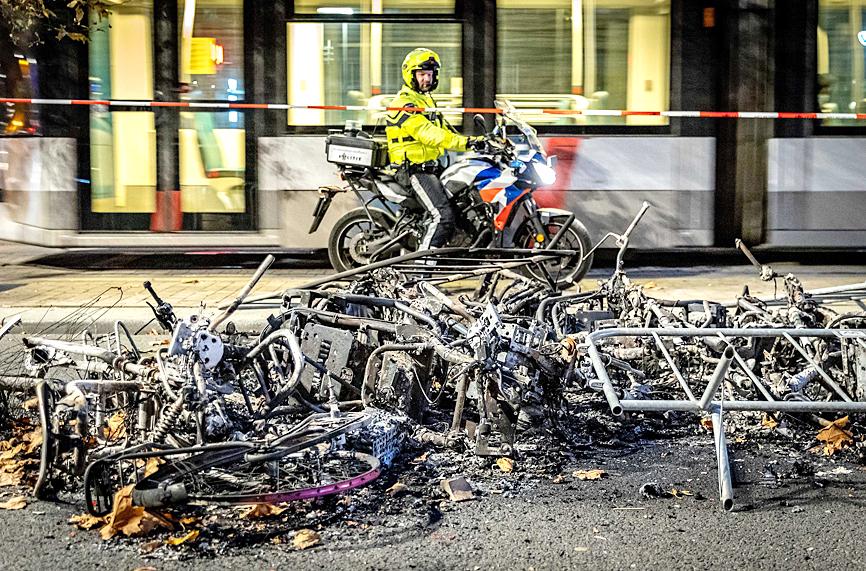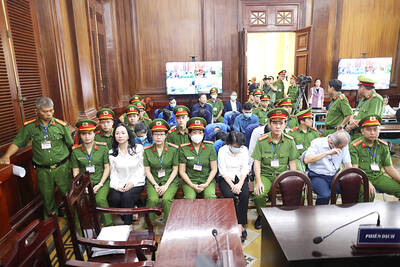When COVID-19 riots rocked the Netherlands for the second time in a year, Ricardo Pronk was there to livestream it all to his followers on social media.
The 50-year-old anti-vaccination activist administered a Facebook group with 10,000 followers, which had shared a call for a demonstration in the port city of Rotterdam on Nov. 19 that later turned violent.
The group, which was recently removed by Facebook, is part of a network of conspiracy theorists and COVID-19-deniers on social media that reached as far as the Dutch parliament, whose influence has sparked concern among experts.

Photo: EPA-EFE
For Pronk, vaccines “are weapons made to kill.”
He also embraces the QAnon conspiracy group’s narrative about “satanic child abuse” by a “globalized elite.”
Yet the unemployed former computer technician, who chose a banner for the group with a lion against a backdrop of flames, rejects any responsibility for the unrest in the Netherlands.
Five people were shot when police opened fire in Rotterdam, and riots spread around the country for the next three days.
“Violence is not the best way, of course not. The best is to do things peacefully,” he said.
In January, during the Netherlands’ worst riots in 40 years over a curfew, and during last week’s unrest, social media were used not only to organize protests, but also to spread disinformation.
“What is unique about the Netherlands is that we have repeatedly seen COVID protests turn into riots just this year,” said Ciaran O’Connor, an analyst at the Institute for Strategic Dialogue in London, which specializes in countering radicalism.
While Dutch Prime Minister Mark Rutte has branded rioters “scum” and “idiots,” O’Connor pointed the finger at the epidemic of conspiracy theories on the Internet in the Netherlands.
On Facebook alone, the top 125 groups disseminating false information about COVID-19 saw a 63 percent rise in followers in six months, comprising 789,000 members in the country of 17 million people, an Institute for Strategic Dialogue study said.
Telegram groups during this month’s riots were filled with plans for demonstrations, calls for riots, along with messages targeting Muslims, Jews and gay people.
The social media groups “usually don’t call for violence, but they may accept it as part of the solution,” O’Connor said. “The anti-vax and anti-COVID movement is creating a space allowing for other forces to engage and express their frustration in a violent way.”
Authorities in the Netherlands blamed the riots on a variety of culprits, ranging from frustrated young people to soccer hooligans and genuine coronavirus protesters — but they also underlined the importance of social media in organizing them.
In June, Dutch intelligence services said they feared that anti-government demonstrations “are a breeding ground for extremism.”
In a country where 85 percent of adults are vaccinated, the anti-vax movement “is a clear minority group,” said Claes de Vreese, a professor of political communication at the University of Amsterdam.
However, unlike in neighboring countries, “their voice has been strongly amplified by the fact that they have found a political ally in parliament,” namely the Forum for Democracy party.
The leader of the far-right party, Thierry Baudet, has largely dropped his anti-immigration rhetoric to adopt a strong anti-vaccination stance and to promote conspiracy theories.
Baudet has been dubbed the Dutch Donald Trump and one of his tweets was labeled misleading by Twitter ahead of elections in March, a first for a Dutch politician.
One of the party’s lawmakers was recently reprimanded for threatening a fellow lawmaker in parliament with a “tribunal” if the Forum came to power, because of his support for the government’s policies.
O’Connor said that some material was slipping under the radar of social media giants because it was in Dutch.
“Compared to the US or the UK, Twitter or Facebook don’t have the same focus on gatekeeping their platforms against people who use them irresponsibly,” he said.

Republican US lawmakers on Friday criticized US President Joe Biden’s administration after sanctioned Chinese telecoms equipment giant Huawei unveiled a laptop this week powered by an Intel artificial intelligence (AI) chip. The US placed Huawei on a trade restriction list in 2019 for contravening Iran sanctions, part of a broader effort to hobble Beijing’s technological advances. Placement on the list means the company’s suppliers have to seek a special, difficult-to-obtain license before shipping to it. One such license, issued by then-US president Donald Trump’s administration, has allowed Intel to ship central processors to Huawei for use in laptops since 2020. China hardliners

A top Vietnamese property tycoon was on Thursday sentenced to death in one of the biggest corruption cases in history, with an estimated US$27 billion in damages. A panel of three hand-picked jurors and two judges rejected all defense arguments by Truong My Lan, chair of major developer Van Thinh Phat, who was found guilty of swindling cash from Saigon Commercial Bank (SCB) over a decade. “The defendant’s actions ... eroded people’s trust in the leadership of the [Communist] Party and state,” read the verdict at the trial in Ho Chi Minh City. After the five-week trial, 85 others were also sentenced on

‘DELUSIONAL’: Targeting the families of Hamas’ leaders would not push the group to change its position or to give up its demands for Palestinians, Ismail Haniyeh said Israeli aircraft on Wednesday killed three sons of Hamas’ top political leader in the Gaza Strip, striking high-stakes targets at a time when Israel is holding delicate ceasefire negotiations with the militant group. Hamas said four of the leader’s grandchildren were also killed. Ismail Haniyeh’s sons are among the highest-profile figures to be killed in the war so far. Israel said they were Hamas operatives, and Haniyeh accused Israel of acting in “the spirit of revenge and murder.” The deaths threatened to strain the internationally mediated ceasefire talks, which appeared to gain steam in recent days even as the sides remain far

RAMPAGE: A Palestinian man was left dead after dozens of Israeli settlers searching for a missing 14-year-old boy stormed a village in the Israeli-occupied West Bank US President Joe Biden on Friday said he expected Iran to attack Israel “sooner, rather than later” and warned Tehran not to proceed. Asked by reporters about his message to Iran, Biden simply said: “Don’t,” underscoring Washington’s commitment to defend Israel. “We are devoted to the defense of Israel. We will support Israel. We will help defend Israel and Iran will not succeed,” he said. Biden said he would not divulge secure information, but said his expectation was that an attack could come “sooner, rather than later.” Israel braced on Friday for an attack by Iran or its proxies as warnings grew of